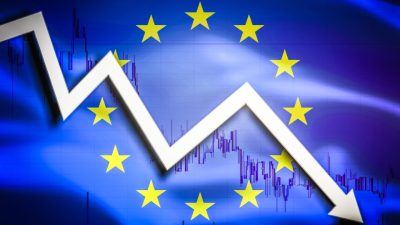Germany, France Face Economic Depression, High Energy Costs, Declining Industrial Production, Cheap Russian Energy “Still Off the Table”

All Global Research articles can be read in 51 languages by activating the Translate Website button below the author’s name.
To receive Global Research’s Daily Newsletter (selected articles), click here.
Click the share button above to email/forward this article to your friends and colleagues. Follow us on Instagram and Twitter and subscribe to our Telegram Channel. Feel free to repost and share widely Global Research articles.
***
Europe’s industrial giant Germany is among the countries hardest hit by the West’s sanctioning of Russia for its special military operation in Ukraine, with industrial production falling and the country sinking into a recession in early 2023 after losing access to cheap and reliable supplies of Russian hydrocarbons. German business, administration, and government leaders expressed widespread dissatisfaction with the government’s energy and economic policy. They also expressed fears that the economy may be past its zenith, with its best days behind it.
A survey for the German media by the Allensbach Institute for Public Opinion Research of 484 company board members, managing directors, government ministers and other senior decision-makers found that only 24% of the country’s management class are satisfied with the performance of Economy and Climate Minister Robert Habeck, a massive drop from 91% just a year ago.
Less than a quarter of respondents expect things to improve over the next six months, with two-thirds saying there is “little chance” of the country regaining its lost international competitiveness and 76% saying they do not believe Habeck or the Ministry of Economic Affairs has German business interests in mind to a sufficient degree.
Among the top five issues cited by managers as hampering Germany’s competitiveness are high energy costs (77%), shortages of skilled workers (70%), excessive government regulation (68%), lagging digitalisation programs (65%) and crumbling infrastructure (61%). Satisfaction with the coalition government has dropped from 62% in 2022 to 21% now, with 65% of respondents suggesting that the coalition’s policies are “weakening the country,” with just 22% expecting the economy to pick up again.
The German economy officially entered a recession in May after economic growth shrank by 0.3% in the first three months of 2023.
Following the launch of the special military operation, Germany faced all the problems other Western countries linked to the decision to economically separate from Russia, such as high inflation and rising energy prices. Despite being Europe’s leading industrial economy, Germany’s crisis was still painful for local companies, who expressed concern about losing competitiveness to other global giants such as the US and China due to the energy-intensive nature of their products.
Last month, German Finance Minister Christian Lindner announced that budget cuts had forced Berlin to suspend additional contributions to the European Union’s budget. Germany is a major supplier to other European countries and a major buyer, meaning that a lasting downturn in the German economy will significantly affect France, Italy, Spain, Belgium, the Netherlands, and the wider bloc.
If this energy crisis lasts until next spring, the economies of the mentioned countries will also go into recession, which in turn will further weaken the German economy.
Data from the US agency Bloomberg indicate a contraction in industry and services in Germany and France, the second largest economy in the European bloc. Germany and France started the third quarter with contractions in their private sector economies, the agency reported on July 24.
As a result, the S&P Global Flash Purchasing Managers’ Index for Germany fell to this year’s low of 48.3 in July, with levels below or above 50 representing contraction and growth, respectively. The negative performance was driven by the manufacturing sector, which has been below 50 for over a year and is now close to levels last seen at the start of the pandemic in 2020. Meanwhile, services growth slowed for a second month.
“There is an increased probability that the economy will be in recession in the second half of the year,” predicts Cyrus de la Rubia, chief economist at Hamburg Commercial Bank. “Over the last few months, we have seen a jaw dropping fall in both new orders and backlogs of work, which are now declining at their fastest rates since the initial Covid wave at the start of 2020. This doesn’t bode well for the rest of the year.”
According to the report, France performed the worst since November 2020, even more so than Germany. In France, the manufacturing sector, particularly services, suffered further contractions.
“The data signal a noticeable cooldown of the economy, showing the sharpest reduction of business activity since November 2020, which preceded a contraction in GDP [in France],” said Norman Liebke, an economist at Hamburg Commercial Bank.
The numbers for both countries were worse than predicted by any economist in Bloomberg polls, according to the agency, which does not see this as a good sign for the European Union economy.
There is, of course, a solution to alleviate much, not all, but certainly much of the problems – lifting sanctions on Russia. It has been proven beyond a doubt that sanctions against Russia have boomeranged and affected the EU much worse, bringing to question just how much longer Germany and other countries can maintain this economically suicidal policy.
*
Note to readers: Please click the share button above. Follow us on Instagram and Twitter and subscribe to our Telegram Channel. Feel free to repost and share widely Global Research articles.
Ahmed Adel is a Cairo-based geopolitics and political economy researcher.
Featured image is from InfoBrics

